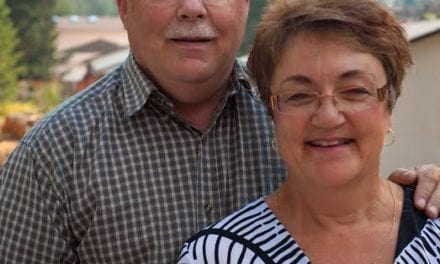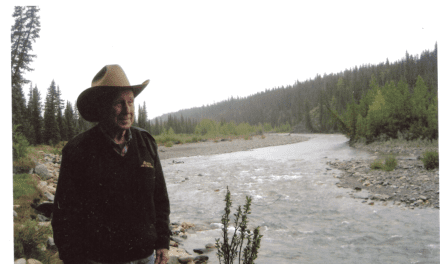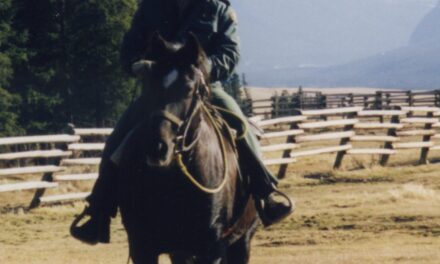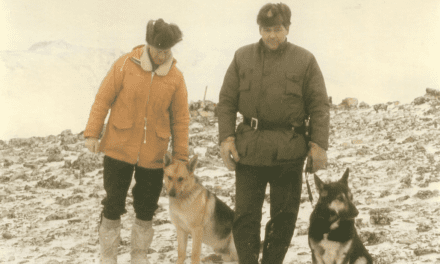(59:40) Duane – Just recently going through my slides, the slides from that trip, I just put on a CD and I sent them to Justin Trudeau because I didn’t know whether he had ever seen them. I know Willi Pfisterer had sent him pictures of the climb. But they (Trudeau’s sons) were just little kids at that time. I got a nice letter back, saying he really appreciated it and looked forward to sharing it with the family and he appreciated that I took the time to do that. It was just kind of neat.
(1:00:11) Donna – I had to laugh…I am on the board for Victim Services, I am on the Board of Directors in Olds and there is one guy on there who drives me nuts! It doesn’t matter how many years ago, “Trudeau wrecked this bloody country.” I thought give me a break. Anyway, so he doesn’t like young Trudeau, Justin. I said, “Why? Do you know him?” “Well no, not really.” I said, “Well, I know him, but I knew his father better.” He said, “You did not.” I said, “I did so…”
“What mountain did you climb?”
(1:00:56) Duane – Mount Edith Cavell. The east ridge of Mount Edith Cavell. He was 66 years old at the time and I never heard him puffing. I heard some of the younger wardens that were with him who after climbing some of the pitches were huffing a bit. But he was in incredible shape for his age. He listened and acted just with whatever he was told. He was not hard to manage. If you told him something or suggested something, he did it. There was no sort of arrogance. He was a good outdoors person from what I gathered. But he knew that he was out of his element and he put himself in our hands. He was very easy to be around.
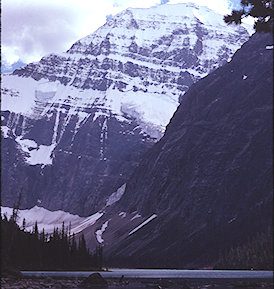
Mt. Edith Cavell 1977
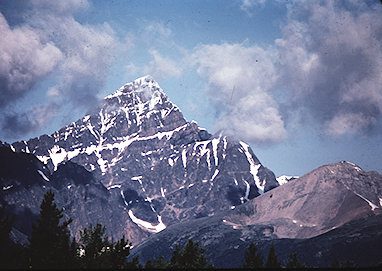
East Ridge Mt. Edith Cavell
Mount Edith Cavell – Jasper National Park
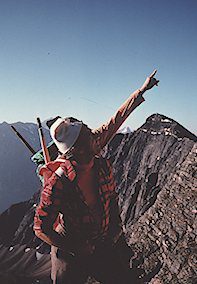
PM Trudeau East Ridge Mt. Edith Cavell 1977
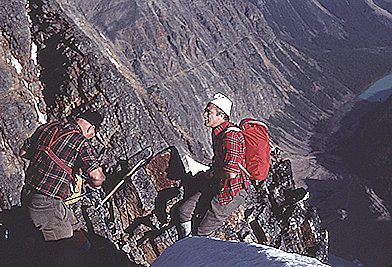
PM Trudeau East Ridge Mt. Edith Cavell 1977
Former Prime Minister Pierre Trudeau, Jasper National Park Alpine Specialist Willi Pfisterer and Pierre Trudeau
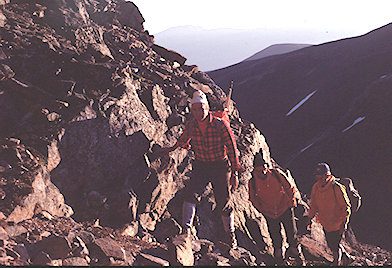
PM Trudeau East Ridge Mt. Edith Cavell 1977 with Abe Lowen and Don Meggison
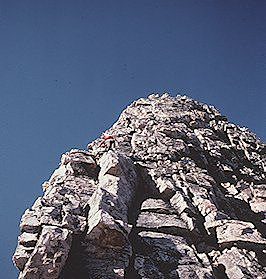
The Buttress East Ridge Mt. Edith Cavell PM Trudeau 1977

The Buttress East Ridge Mt. Edith Cavell 1977 PM Trudeau and Willy Pfisterer
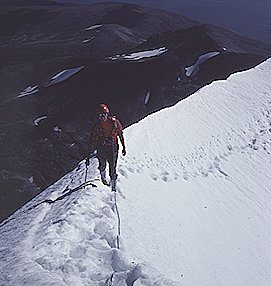
PM Trudeau East Ridge Mt. Edith Cavell 1977
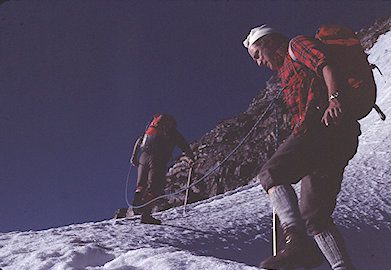
PM Trudeau East Ridge Mt. Edith Cavell 1977 with Willy Pfisterer
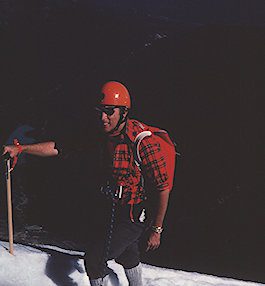
PM Trudeau East Ridge Mt. Edith Cavell 1977
(1:01:51) Donna – Just easy to be around period.
(1:01:54) Duane – I know when he had coffee with Donna in the morning we didn’t have any milk. So she had the creamer, like the powdered stuff. He had to ask how much to put in because he had never seen that or used that before. I guess they didn’t have it at 24 Sussex Drive! It was the same thing when we were out on the climb. Willi Pfisterer brought the lunch along and it was just the standard, bread and cheese and salami. He took a pocket knife out and passed it around and we cut chunks off. He was enthralled with that. He had never of course done that…We got to the top of the mountain and a young Jasper couple just got married. They climbed Edith Cavell as sort of a wedding present to themselves. So they were on the top and they got congratulated and wished good luck by the prime minister of the country…
(1:02:56) Donna – They couldn’t believe it! It was the same when you took him into the bar. When you guys all went into the bar after the climb, the Athabasca Bar.
(1:03:03) Duane – We said it was traditional with the wardens, whether it was or not, to have a beer after a climb. We said, we could go to town and pick up (some beer) because he had his security guys with him…He said, “No, do you have a bar in town?” We said, “Sure.” He said, “Let’s go there and I will buy you a beer.” We took him into the Athabasca Bar and kind of stuck him in the back at a round table in the corner. He bought the beer and we had a really good visit. It took about ten minutes for the few that were in the bar to recognize him. One fellow came over and was very polite with him. He shook his hand and Trudeau said, “Here I will buy you a beer.” The guy took it and said, “I am taking his home.” He put it under his jacket and it is probably still in his fridge you know. The prime minister bought him a beer! Then one of the local drunks came over, he had been eyeing him for a while. He staggered to the table and you could see the Mounties starting to sit up a little bit. The guy came over and said, “You are that Trudeau guy…I just wanted to come over and talk to the guy who F’d up this country.” Trudeau looked at him and said, “You know my friend, it looks like you are kind of F’d up yourself, you just need to go home and sleep it off.” The guy turned around and off he went. It was amazing to watch, in that when people came over he was very genial and open to them, but he didn’t take guff from anyone either…
(1:04:47) Donna – That is what I liked about him politically too…He will go down in history as one of the best prime ministers this country has had, I think. He put Canada on the map really.
(1:05:03) Duane – That was definitely a highlight…
(1:05:06) Donna – You know we had met other people to over the years from different countries.
“I read about you meeting Japan’s Minister of Finance.”
(1:05:14) Duane – His son. We just met him on the street.
(1:05:15) Donna – Shintaro. His name was Shintaro Ito. He sent us Christmas cards for about three or four years and then we lost touch…He wouldn’t dance with me, because you don’t ask a married woman if you are single to dance in Japan. We spent the whole day with him and we went to have dinner…and then this was at the Marmot and there was music playing…I think I got the best compliment in the world from him because he said, “You know when I get married…” It was the last thing he said to me as he was leaving the car, “I want to marry somebody just like you. You could be a queen in any country in the world.” He was sweet!

Currently,Shintaro Ito is a Japanese politician of the Liberal Democratic Party, Wikipedia
(1:06:08) Duane – He was telling us about life in Japan and showed us some photos of him being dressed up in his traditional outfit. He said, “That was myself and my father, before we met the emperor.” We said, “What does your father do?” He said, “He is the finance minister of Japan.” I said, “Do you have a car over there?” He said, “Yes.” “Like a Toyota or something?” He said, “No a Maserati.” Obviously they were relatively well off! He was just the nicest young fellow.
(1:06:46) Duane – Again it was just a casual meeting on the street, other places you never would have done that. We met all kinds of people like that.
(1:06:53) Donna – Absolutely!
(1:06:54) Duane – Because of being in the park and sometimes being in uniform they would approach you. Other times you just met…
(1:07:02) Donna – We took Darren for lunch. He was a cute kid, he is a nice looking man now. He (Shintaro) left the restaurant and he came back and said, “May I sit down for a minute?” We said, “Sure.” He said, “I was just sitting here looking, could I take pictures of your son? He is such a cute kid.” Our son would have been about ten. We got talking to him.
(1:07:32) Duane – He was in town for a couple of days. We said, “Have you done this or done that? Or done something else?” He said, “No.” So I had the day off.
(1:07:37) Donna – We spent the whole day with him and the evening because he came to have dinner at our house.
(1:07:43) Duane – Just experiences like that, that were unique added to the overall experience of being a warden. It was just a feeling overall too…that that area (the national park) belonged to you. You were responsible for it. So it did seem more important to help people or do things like that.
(1:08:12) Donna – Yeah, it was really interesting. An interesting life in many ways.
(1:08:22) Duane – I guess as an aside, one issue that I was proud of, was after one of the changes in the National Parks Act that enhanced law enforcement…They decided to create a shield, as an enforcement badge rather than using the hat badge that people carried for years. They wore one on their Stetson and they carried one in their wallet. So we got them to design a real shield. It looked similar to what the RCMP carried. Just if you were in plain clothes and wanted to officially identify yourself, it had an identity card and then this shield that looked official. They were getting it manufactured in Ontario and somehow the RCMP got their nose into it and they didn’t like the idea of having a peace officer on there. The way that they interpret the law, they were peace officers and nobody else could be…We got wind of this and Ottawa was getting cold feet, so I called the law enforcement specialist in Ontario who was working with the manufacturer. I said, “Have they shipped them yet?” He said, “No.” I said, “Why don’t you get them to change the address to Calgary and ship them out west.” So he did that. About two weeks later, this big box of shields showed up and we just got a list from all the other law specialists across Canada and sent them their box of shields…By the time Ottawa found out about it, they had already distributed them in the field and they couldn’t take them back. They were quite unhappy about that, but I know had we not done that they would be sitting in a box in Ottawa somewhere today. They didn’t have the confidence to do that, if the RCMP questioned something they just (backtracked)…We probably got under the wire by a week or a few days.
(1:10:32) Donna – But you have always had a good rapport with the RCMP, personally anyways.
(1:10:38) Duane – But on a corporate level they look at everything other agencies do…Somebody there just sort of decided they didn’t like the peace officer designation…
(1:10:57) Donna – Duane set up training in Regina for the law enforcement and it worked really well, didn’t it?
“I read you received recognition from the Commanding Officer of the RCMP…Was that in regard to setting up this program?
(1:11:17) Duane – It was. Starting in 1975, at the Palisades area in Jasper they turned it into a national training center. So national training courses were delivered there and they had a series of law enforcement training courses at the time and they were delivered by contract from the Calgary City Police guys…They delivered a recruit course and then we had what was called a basic warden course, it was a refresher, then we had an advanced law enforcement course. It was more like an investigators course. They ran that for three years. When I went to Ottawa we made an approach to the RCMP to train at. Depot. We thought, “We are another federal agency.” And we knew Federal Fisheries were training there at Depot, so we made an application. I went out for about three days and they toured me around. They were very positive about it. They wanted to bring other people in. Probably about two weeks later, I got a phone call from the Sergeant Major of the day at Depot. He just said, “We don’t have room for you guys. It is not happening.” I think what it was, was just the old line RCMP didn’t want outsiders around the “baby” Mounties (a term we had for recruit RCMP cadets) training, they wanted to keep it for themselves. So that kind of fell by the wayside. We delivered it in Jasper for another few years. In 1993, the RCMP were approached again and what transpired was they said, “Yeah, we would be interested in delivering your training. But, we do law enforcement in a different regime than you guys do, you don’t have the same backup, you work in the backcountry.” We said we’d prefer to show you how we do law enforcement and then we will design a course around that.” So we did what we called the “musical ride”. We brought about eight of the RCMP out. We started in Calgary and did a little overview there. Then we went to Banff and spent a couple of days there. Banff kind of did their dog and pony show about law enforcement. Then we went up to Jasper and took them on a short ride. There was a cabin there that you could take about four hours to ride in to. We loaded them all up on horses and rode out to the cabin and stayed overnight. We flew them around in the helicopter the next day to the boundary areas and some of the backcountry. Then from there we went back to Regina and spent a couple of weeks designing a series of courses that the RCMP ran for us and they are still doing it today. It turned out to be really successful. I think it really enhanced the training in law enforcement in terms of professionalism. They pushed Parks to adopt more and more of their standards, making a national standard for how we train…Now with the arming on the table that is another component that they can just add in. Again, it makes it closer to their program…We just had a shorter program, but we now train to more of their standards. So it has been positive and they are still doing it.
(1:15:09) Donna – You went to Shawn’s graduation and the guy who gave the speech…
(1:15:15) Duane – Yeah, the Assistant Commissioner at Depot. He was one of the corporals that was on the “musical ride”…
(1:15:26) Donna – He mentioned about you guys and the musical ride in the backcountry. I think they really liked it, I think it really opened their eyes.
(1:15:37) Duane – They were suspicious though because of course they are mounted police and most of them had never ridden a horse in their life so they were waiting for us to set them up and get them bucked off or do something. Of course we wouldn’t do that, but they were on pins and needles for a while because they assumed that we would try and embarrass them in some manner, but we didn’t. I guess the funniest part of that trip was when we got into Willow Creek cabin, they had flown in extra tents and supplies to feed us and house us for the couple of days that we were out there. When we arrived there was an outfitter that we rented horses from and another cowboy there with boots and a hat and a big mustache. As soon as we pulled in, everybody pitched in and unpacked the horses, set up tents and all that stuff. (This cowboy) was sitting around the fire with a slicker on and a hat telling horribly funny stories, horse stories and that. We went to bed and got up in the morning and they knew that we were going to fly them around the country…We finished breakfast and this cowboy walked over and got in the helicopter and started it up. You could see the Mounties, “Is he supposed to be in there?” Like he was just unpacking the horses…It was Todd McCready. Of course he had grown up in an outfitter family…like the RCMP pilots are all in their fancy gear…We said, “The pilot is slow getting up in the morning so he showed Todd how to start it.” So we had them on the ropes a little there in the morning! But then we said, “No, you are flying with probably one of the best mountain pilots that you are ever going to fly with.” It took them completely by surprise that this guy sitting around the campfire dressed like a cowboy, telling cowboy stories got in there and flew that thing!
You also received the Peace Officer’s Exemplary Service medal from the Governor General? What year was that?”
(1:17:51) Duane – Yep, that was in 2007… The government created a new medal, they had a series of medals for the RCMP and EMS people…so they created this peace officer medal for Federal Fisheries, CWS (Canadian Wildlife Service) Parks Canada, Customs and some of those folks who did law enforcement, but not as regular police officers. They just commissioned a medal for exemplary service for that class of law enforcement officers. When the commissioned it and launched it they put out a call for five representatives from each of those different agencies to come and have it presented as a kick off. Then people who were eligible for it would eventually get it locally at some point in time, but to kick it off they had this ceremony.
(1:18:56) Donna – It was a wonderful ceremony!
(1:19:00) Duane – Five out of Parks got to go down and have it presented by the Governor General. So that was special.
(1:19:06) Donna – It was Michaelle Jean, she is so nice…
(1:19:12) Duane – It was very, very nice. A nice way to close the door too.
(1:19:16) Donna – You know we lived in Ottawa all that time and I think it was the only time I was in the Governor General’s house…
(1:19:28) Duane – There was no reason to be.
(1:19:30) Donna – Well, it is pretty darn fancy!
(1:19:43) Donna – It is just my opinion of course, but he deserved everything he got!
What about the service was important to you? Was it the idea of protecting the national parks?”
(1:20:10) Duane – I think so, yeah. Right from day one you had this sense that it was something special. The area was special so the job was special and it just seemed like everything we did certainly over the first few years of my career reinforced that. You know that this is a special job and these are special places. At times you heard internationally the Mounties and Parks Canada were two of the classical Canadian symbols that people recognized. So it was some of that and you were involved as a warden in protecting this stuff, not just cleaning toilets in the campground or something like that. You were protecting this, this was your responsibility. I think that was one of the major sort of feelings, it was important work. But it could have just been a warden attitude about ourselves. I know later on in time the managers referred to the warden service as the green machine. They saw it as a powerful voting bloc I guess…
(1:21:26) Donna – Latourelle still feels that way, doesn’t he?
(1:21:26) Duane – I think overall yeah…They tried over the years to destabilize the warden service or decommission it in some ways by pulling it apart, but it always seemed to come back together. But lately they have figured out a way to do that…One of the things they didn’t understand and maybe it led to that attitude that we were hard to get along with and we’d work outside the box sometimes, was things would be proposed in Parks that we just knew weren’t right and wardens to their credit would find ways to get the word out…and managers didn’t like that a lot. There were times where I know that we really pushed them by getting something that they didn’t want out in public. It was just like that is our job, we are here to protect it and if you are going to do something that in our view is going to screw it up we will find a way to (stop it).
(1:22:37) Donna – It doesn’t seem like they care about that anymore…Hardly anybody goes to the backcountry anymore.
(1:22:43) Duane – It has changed for sure.
(1:22:44) Donna – It has changed so much…
